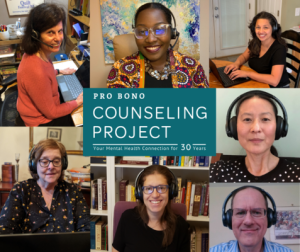A Way to Refill Their Cup
The Pro Bono Counseling Project uses health care grant to connect caregivers to donated therapy sessions
 When 30-year old Jasmine moved home to take care of her father with cancer and mother with depression and hoarding issues, she needed someone to help her through the grief, pain, and psychological stress of becoming a caregiver. Enter Pro Bono Counseling Project.
When 30-year old Jasmine moved home to take care of her father with cancer and mother with depression and hoarding issues, she needed someone to help her through the grief, pain, and psychological stress of becoming a caregiver. Enter Pro Bono Counseling Project.
About Pro Bono Counseling Project
Pro Bono Counseling Project (PBCP) connects individuals, couples, and families living in Maryland to free mental health services, whether they are experiencing stress, anxiety, sadness, grief, a life transition, or relationship issue.
“We really work with folks to make a good match between patient and therapist,” describes Amy Greensfelder, Executive Director. “This fit is the most important predictor of success in therapy. We interview people up front to find out what they’re looking for in a therapist, and we use our extensive network of clinicians to find the best match.”
Founded over 30 years ago, PBCP has helped over 30,000 Marylanders find volunteer counselors and receive the therapy they otherwise could not afford. Over 850 volunteer clinicians work with PBCP’s clients to provide thousands of hours of donated therapy sessions each year.
Caring for Caregivers
PBCP’s Caring for Caregivers program helps people cope with the psychological stress of caring for a loved one with high medical needs or a chronic condition.
“Caregiving is often an unrecognized, misunderstood, and neglected issue in our community. Even caregivers themselves may not identify with the term. Because the vast majority of caregivers are loved ones – a spouse, a parent, a child, or a family member – they might classify ‘caregiver’ as someone who does the job full-time, or is a paid professional,” mentions Greensfelder
Meanwhile, the competing priorities caregivers face, such as work, family, and medical management, often block their ability to take care of their own mental health needs. The Caring for Caregivers program helps these to find the space to “refill their cup,” as Greensfelder puts it.
The Knott Foundation supported PBCP’s Caring for Caregivers program with a grant in 2020. That support enabled PBCP to train more than 40 clinicians in caregiver mental health practices, to answer 41 phone calls from people experiencing caregiver stress, and to serve 30 people with 300 hours of donated therapy – equating to $45,000 of donated care.
Recognizing the Need
Oftentimes people focus on those with the highest need – the parent who just received a cancer diagnosis, the grandparent who is aging in place, or the child who is born with a chronic health condition. While this focus is necessary, it can gloss over the needs of the caregivers.
“The biggest thing is just recognizing these needs in our community and being there when our friends and loved ones step into the role of caregiver,” reflects Greensfelder. “It’s important to make sure people who are supporting the needs of others also support themselves.”
